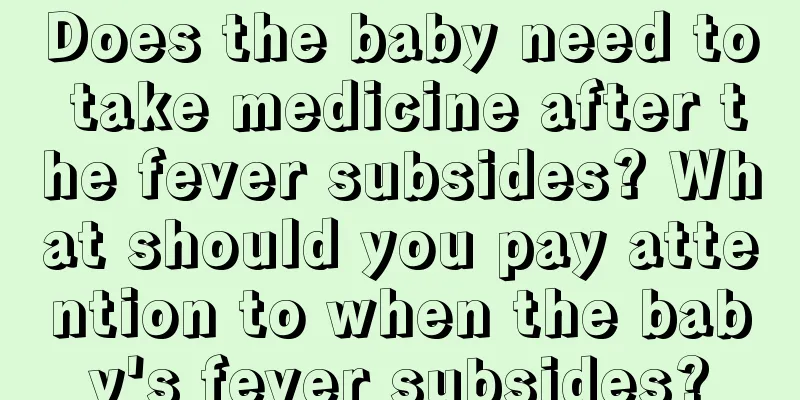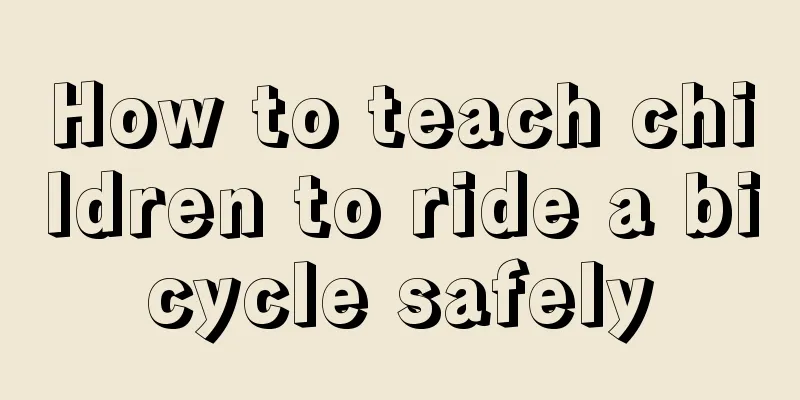Does the baby need to take medicine after the fever subsides? What should you pay attention to when the baby's fever subsides?

|
When a baby has a fever, some parents will take the baby to the hospital immediately. The doctor will give the baby an IV and prescribe medicine according to the baby's physical condition. So, after the baby's fever subsides, do you still need to take medicine? Does the baby need to take medicine after the fever subsides?It depends on the recovery situation. 1. If the fever goes down after taking antipyretics, the effect of antipyretics is about 4-6 hours. If the cause of the fever is not effectively controlled, the fever will still recur, so you have to continue taking medicine. 2. If the fever is caused by a viral infection, you can usually take Chinese patent medicines that clear heat, detoxify, and fight viruses, such as antiviral oral liquids, etc. If the fever is caused by a bacterial infection, take amoxicillin or cefaclor for anti-infection treatment. 3. If the fever has subsided for more than 48-72 hours and there are no other clinical symptoms, the condition is considered to be under effective control and no medication is needed. 4. If other symptoms still exist after the fever subsides, such as cough and wheezing for respiratory symptoms, diarrhea and vomiting for digestive symptoms, etc., medication should still be used to treat respiratory or digestive symptoms. What should you pay attention to when your baby's fever goes down?1. Do not use a blanket to cover the baby to reduce fever. Many mothers believe that babies need to cover their fever to sweat and the disease will heal quickly. In fact, covering the baby to sweat depends on the situation. If the baby's hands and feet are cold, covering the baby to sweat is good, but if the baby's body is hot, covering the baby for too long will affect the heat dissipation and cause "heat syndrome". In severe cases, it can also induce high fever convulsions and dehydration. Therefore, when the baby's hands and feet are hot, do not cover the baby to sweat. 2. Do not use alcohol bath to reduce fever. The baby's body temperature is high, and wiping with alcohol can quickly lower the temperature. However, if the wiping time is too long, the skin will absorb a large amount of alcohol and it is easy to get alcohol poisoning. Therefore, in order to avoid alcohol poisoning in the baby, it is best for the mother not to use this method to reduce fever. 3. Do not use antibiotics for fever. Although more than 90% of colds and fevers are caused by viruses, and antibiotics have a certain inhibitory effect on viruses, the abuse of antibiotics will produce drug resistance and is not conducive to the treatment of diseases. Therefore, mothers should not blindly use antibiotics on their babies when they have a cold and fever. 4. Don't get a fever-reducing injection. Many small clinics will give fever-reducing injections to patients with fever, but common colds and fevers can be relieved by physical cooling or oral medication. It is unnecessary to get a fever-reducing injection, which will bring additional risks. The fever-reducing injection contains two ingredients, analgin and dexamethasone, which are potentially harmful to the baby's health. What to do if your baby keeps sweating when the fever subsidesAfter taking antipyretic drugs, babies often sweat profusely. This is because the baby's sweat glands are open and the fever is going down. Don't worry. Just wipe the baby's body in time and keep the air circulating in the room. Sweating after a child has a fever indicates that the fever is going down. At this time, you can't take off the child's clothes immediately. You can use warm water to wipe the sweat off the baby's body, and then change the baby into some dry clothes. Don't let the baby get cold in the wind to prevent the symptoms of fever from getting worse. Things to note when your baby sweats during feverPay attention to the baby's body temperature. If the baby's temperature drops below 38.5 degrees, it means that the antipyretic medicine is effective. At this time, strengthening care will improve. Mothers should measure the baby's temperature every 1 to 2 hours until the baby's temperature returns to normal. The baby's body temperature should be observed at any time. If the baby has repeated fever, mothers should take the baby to the hospital in time to avoid delaying the best treatment time, which will bring more adverse reactions to the baby and affect the baby's healthy growth. |
<<: What causes pharyngitis in children? Can pharyngitis in children heal itself?
Recommend
What foods are good for your baby's brain? What foods can your baby eat to nourish his brain?
What foods are good for the baby's brain? Par...
How to make your child grow taller by using massage techniques
Massage is one of the most basic health-preservin...
What should I do if my baby has tonsillitis? What are the symptoms?
Babies can easily get tonsillitis due to a cold. ...
What are the dangers of sharing tableware with babies?
Some adults will share tableware or food with chi...
How to prevent children's tonsillitis in winter
Tonsillitis is a common childhood disease, which ...
Can pregnant women eat crabs in the fourth month? What can't pregnant women eat crabs?
There are many things that pregnant women need to...
How to make complementary food for babies How to make complementary food for babies
After the baby is six months old, it is necessary...
How long does it take for Tianxi Pills to take effect? How long does it take for Tianxi Pills to become pregnant?
Many people take Tianxi Pills but don’t know much...
Can I eat spicy food during breastfeeding? What effect will eating spicy food during breastfeeding have on the baby?
Breastfeeding mothers are very careful about thei...
How to supplement zinc deficiency in babies? What are the causes and symptoms of zinc deficiency in babies?
Babies are always prone to various diseases, many...
Can pregnant women eat boiled shrimp? Is it good for pregnant women to eat boiled shrimp?
Boiled shrimps are shrimps that have been blanche...
When to use baby shaping pillow? What brand of baby shaping pillow is good?
Most mothers know that because babies are very sm...
How to train your baby to eat by himself? How to train your baby to eat by himself
When babies are young, they need to be fed by the...
Can I still get pregnant with endometriosis?
Endometriosis is a common gynecological disease t...
Can babies with eczema bask in the sun? Can babies with eczema heal on their own?
Eczema is a disease that many newborn babies will...









